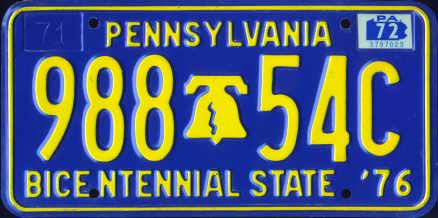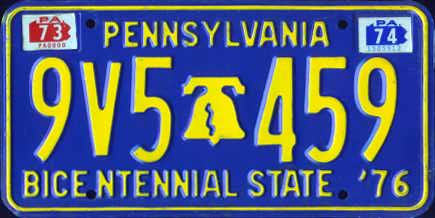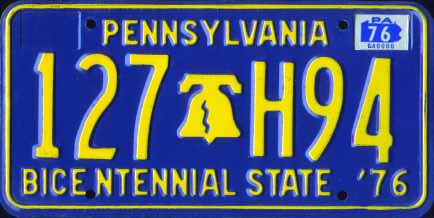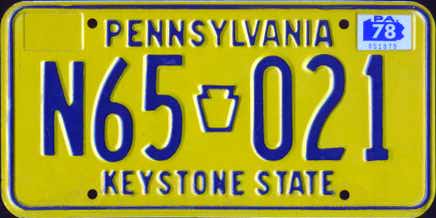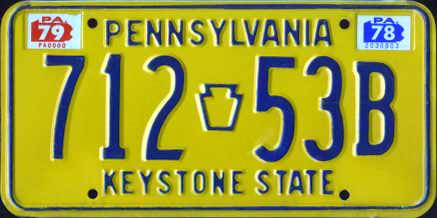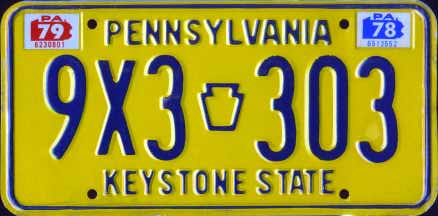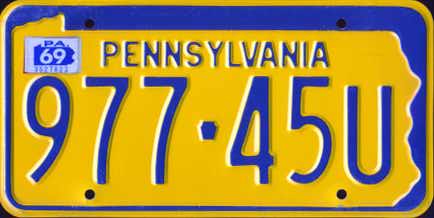 |
Pennsylvania 1969 passenger issue. This undated baseplate was introduced in 1965 and used through the end of 1970. Plates were issued in a five-numeric, one-alpha format, with the letter appearing in various places through the serial. The series started with the letter in the first position, then the last, then second, third and so on through the series. Pennsylvania plates featured a state-shaped border from 1937 through 1970. |
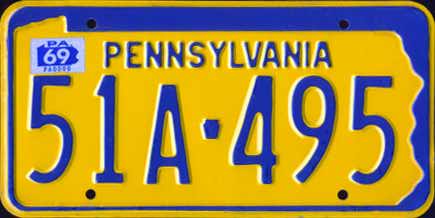 |
Pennsylvania 1969 passenger issue. Continuation of the above base, this was a natural 1969 expiration and had the alpha character in the third position of the serial. The letter series never reached the fourth position on this base. This was the last baseplate to feature the state outline. |
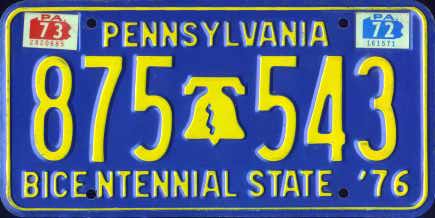 |
Pennsylvania 1973 passenger issue (1971 base). The Bicentennial State base was introduced at the end of 1970 and had a lightly etched "71" in the top left sticker box. It was then used with stickers through the end of 1976. This plate won ALPCA's Plate of the Year award for 1971. Again, the numbering series was started with all-numeric. It then switched to five numeric, one alpha and seemed to start with the letter in the first position, then last, and then through the rest of the positions in order. Different letter positions are shown below. |
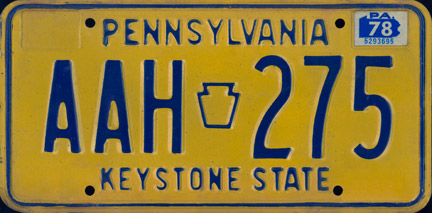 |
Pennsylvania 1978 passenger issue. In late 1978, Pennsylvania switched to a more conventional ABC-123 format. This format was used through the GZZ series on this blue-on-orange base through 1983, when new baseplates were introduced. |
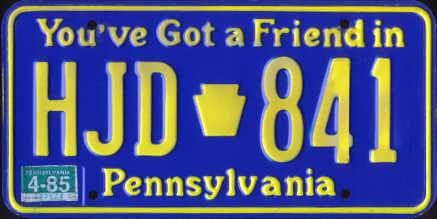 |
Pennsylvania 1986 passenger issue. This base reversed the color scheme back to orange on blue and switched to a controversial new slogan, "You've Got a Friend in Pennsylvania." The slogan was instituted during the administration of Governor Richard Thornburgh and was a play on the song title "You've Got a Friend" and also a 'too clever for its own good' reference to the Society of Friends (Quakers), the religious group which contributed to the founding of the colony of Pennsylvania. This series was not especially popular and was used from the HAA series in 1983 through the end of the RZZ series in 1987. This base could have been re-validated through the end of the general plate reissue that was completed in 2002. |
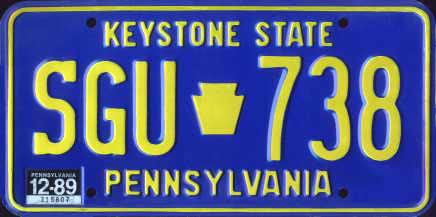 |
Pennsylvania 1989 passenger issue. In 1987, Governor Robert Casey took office and ordered that the previous administration's "Friend" slogan be given the boot. At this point, the state continued the color scheme and numbering format of the previous base, but returned to the older "Keystone State" slogan. This move was also very popular with traditionalists and the state's "anti-friendship" lobby, I'd imagine. These plates were issued from series SAA through the end of the sequence at ZZZ-999. |
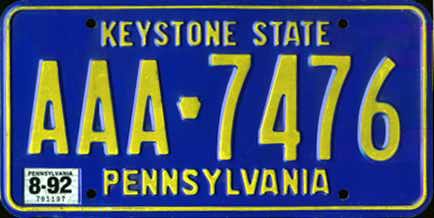 |
Pennsylvania 1992 passenger issue. At the end of the ABC-123 format in 1991, seven-digit plates were introduced in an ABC-1234 format. These plates retained the design, slogan and colors of the previous plates, but with a smaller Keystone divider to accommodate more numbers. This remained the standard general-issue passenger plate into the early-"C" series in mid-2000. Pennsylvania phased in a new general issue between 1999 and 2002, replacing all 1977-2000 plates in the process. |
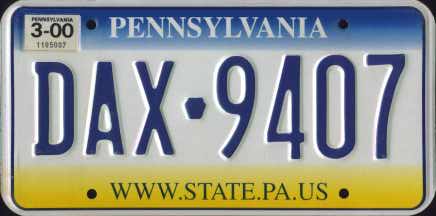 |
Pennsylvania 2000 passenger issue. This new general-issue baseplate was introduced in September, 1999 and replaced all 1977-2000 plates by the end of 2002. This new design retains the seven-digit format, starting at plate number DAA-0001 and the keystone-shaped divider. A fade from blue to white to gold is used for the background. The most talked-about addition to the plate, however, is the "slogan", which is the state's web site address, "WWW.STATE.PA.US". This is the first use of an internet address on a license plate (though not the last, as West Virginia and Washington, D.C. have already followed suit, with other states considering the move as well). Governor Tom Ridge chose to place the address on the plate to signify that Pennsylvania is "high tech, high energy and ready for the new millennium," according to the press release about these plates. Reaction to the plates has been mixed, although I must admit that they're growing on me. |
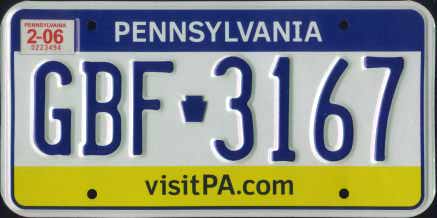 |
Pennsylvania 2006 passenger issue. In late 2004, Pennsylvania tweaked their website plate, changing the coloring, fonts and web address. The fades at the top and bottom were converted to solid bands of color, with the web address shortened to "visitPA.com," the state's current tourism address. At this time, the Keystone separator was also made larger and more prominent than on the previous seven-digit issues. These changes took place at the GBA series of plates (Pennsylvania no longer issues plates with 'A' as the second character, so the first Gxx plate series was GBA.) |
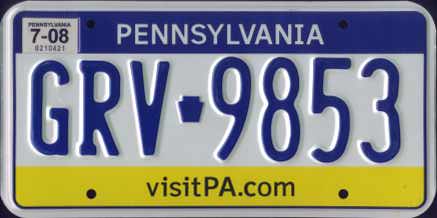 |
Pennsylvania 2008 passenger issue. Starting in mid-2007, Pennsylvania plates began to appear with background sheeting made by Avery, as opposed to the previous 3M sheeting. They did a pretty decent job of matching the old sheeting in this case, so the plates are difficult to tell apart. The Avery plates do seem to use a slightly thinner font for the state name and web address, and have the telltale "sheen" to their appearance. The first of the plates with the new sheeting appears to have been somewhere in the late GNx series. |
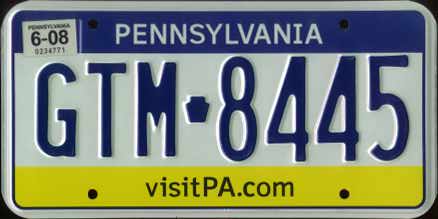 |
Pennsylvania 2008 passenger issue. Also in 2007, a new die set for at least the numbers started to appear. The difference is most obvious when comparing the '5' die on this plate to the one above it, with this one having a straighter back and more rounded bottom than the previous, traditional Pennsylvania die above. I've seen plates after this series with the older dies, however, so it doesn't appear to be a clean break with one set replacing the other. |
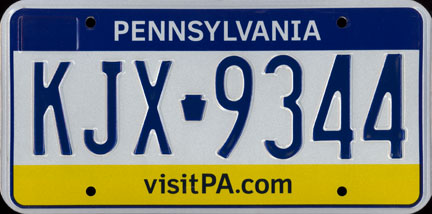 |
Pennsylvania 2018 passenger issue. In 2016, Pennsylvania joined a growing number of states discontinuing validation stickers on their plates. Unlike some other jurisdictions, Pennsylvania chose not to issue any kind of blanking sticker to cover the older stickers, resulting in most motorists driving around with "expired" 2017 and early 2018 stickers. New registrants after mid-2016, in the mid Kxx series, received plates with no validation sticker at all, after which a further design change was made (see next.) |
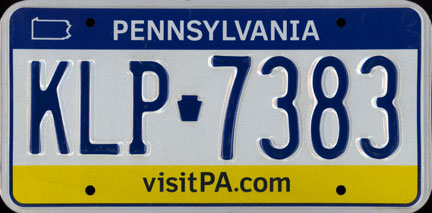 |
Pennsylvania 2018 passenger issue. After discontinuing stickers, Pennsylvania tweaked the plate slightly, removing the no-longer-needed sticker well from the top left of the plate and adding in its place a small state map outline. Not sure what the motivation for adding the map was, possibly an outward indication to law enforcement that "it's cool that this thing doesn't have a sticker." |
Additional Pennsylvania information provided by: Bill Stephens, Sharon Turner, Dave Swanson





